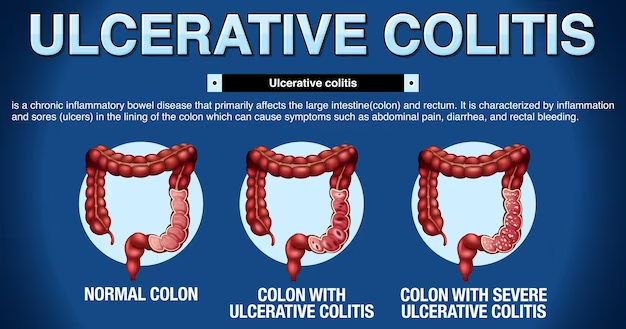Diseases

Ulcerative Colitis
Ulcerative colitis is a chronic inflammatory bowel disease that affects the colon (large intestine) and causes symptoms such as abdominal pain, diarrhea, rectal bleeding, and weight loss. Ayurveda, the traditional system of medicine from India, offers a holistic approach to managing and treating ulcerative colitis. Here's how Ayurveda views and manages this condition:
1. **Dosha Imbalance:** Ayurveda considers ulcerative colitis to be primarily caused by an imbalance in the body's doshas, particularly Pitta and Vata. The specific dosha imbalance can vary among individuals and influence the nature and severity of the condition.
- **Pitta Imbalance:** Pitta aggravation can lead to inflammation, ulceration, and bleeding in the colon. It may also cause diarrhea, acidity, and an increased sensitivity to spicy or hot foods.
- **Vata Imbalance:** Vata imbalance may result in symptoms like abdominal pain, gas, bloating, and irregular bowel movements.
2. **Dietary Modifications:** Ayurvedic dietary recommendations for ulcerative colitis are aimed at pacifying aggravated doshas, particularly Pitta. The following dietary guidelines are often suggested:
- Avoid spicy, acidic, and fried foods.
- Consume cooling and soothing foods, such as rice, cooked vegetables, yogurt, and fresh mint.
- Stay hydrated by drinking room-temperature water.
- Herbal remedies like aloe vera and licorice may be recommended to reduce inflammation and soothe the digestive tract.
3. **Herbal Remedies:** Ayurvedic herbs and formulations are commonly used to manage ulcerative colitis symptoms and balance doshas. Some commonly used herbs include:
- **Kutaj (Holarrhena antidysenterica):** Known for its anti-inflammatory and anti-diarrheal properties.
- **Bilva (Aegle marmelos):** Used to alleviate digestive discomfort and diarrhea.
- **Amla (Indian gooseberry):** Rich in antioxidants and vitamin C, it helps strengthen the digestive system.
- **Haritaki (Terminalia chebula):** Supports overall digestive health.
4. **Panchakarma:** Ayurvedic treatments like Panchakarma, which includes procedures like Basti (enema therapy), can be beneficial in cleansing the colon, reducing inflammation, and restoring balance.
5. **Lifestyle Modifications:** Stress management is crucial for individuals with ulcerative colitis, as stress can exacerbate symptoms. Ayurveda recommends practices like yoga, meditation, and pranayama (breathing exercises) to reduce stress.
6. **Individualized Treatment:** Ayurvedic treatment for ulcerative colitis is highly personalized. It takes into consideration the patient's dosha constitution, the stage and severity of the condition, and other individual factors.
7. **Long-Term Management:** Ayurveda often focuses on long-term maintenance and prevention of flare-ups. This may involve ongoing dietary adjustments, stress reduction techniques, and the use of Ayurvedic remedies.
It's essential to work with a qualified Ayurvedic practitioner who can provide a comprehensive assessment and create a personalized treatment plan for ulcerative colitis. Ayurveda can be used alongside conventional medical treatment to manage symptoms and improve the overall well-being of individuals with this condition. Always consult with your healthcare provider before making significant changes to your treatment plan.
